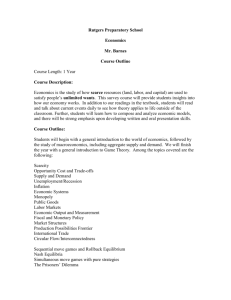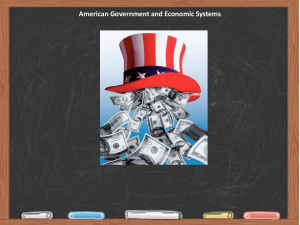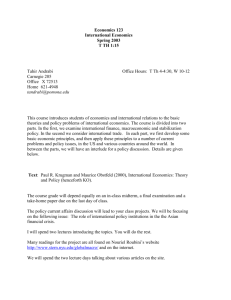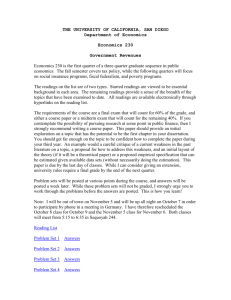The Heller School for Social Policy and Management
advertisement
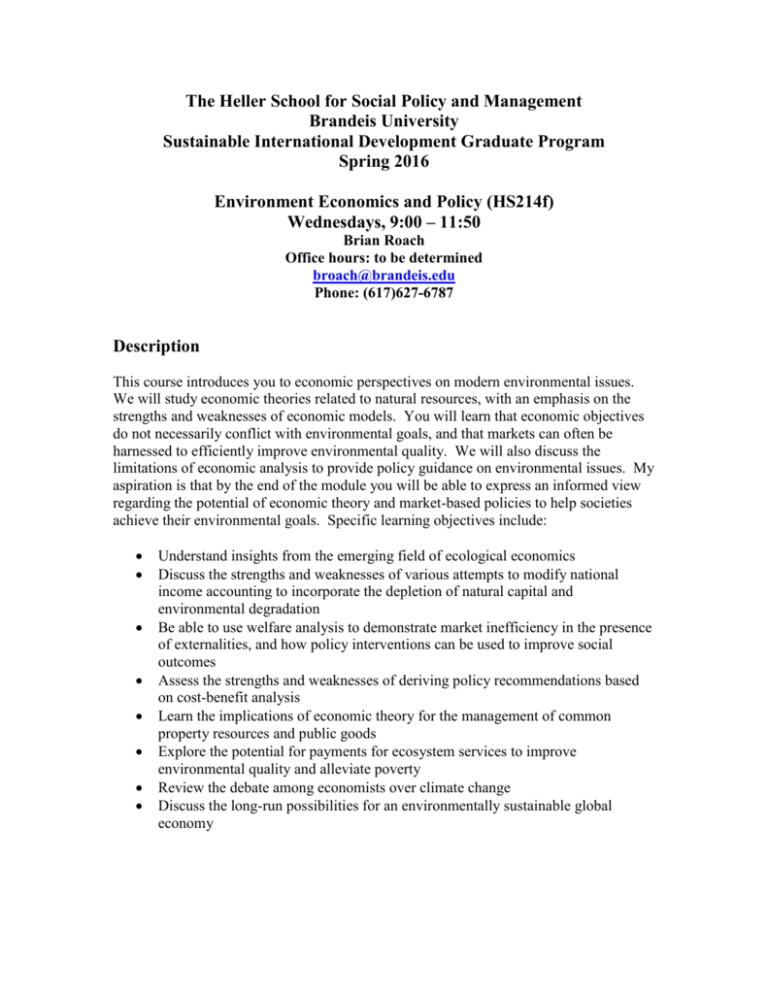
The Heller School for Social Policy and Management Brandeis University Sustainable International Development Graduate Program Spring 2016 Environment Economics and Policy (HS214f) Wednesdays, 9:00 – 11:50 Brian Roach Office hours: to be determined broach@brandeis.edu Phone: (617)627-6787 Description This course introduces you to economic perspectives on modern environmental issues. We will study economic theories related to natural resources, with an emphasis on the strengths and weaknesses of economic models. You will learn that economic objectives do not necessarily conflict with environmental goals, and that markets can often be harnessed to efficiently improve environmental quality. We will also discuss the limitations of economic analysis to provide policy guidance on environmental issues. My aspiration is that by the end of the module you will be able to express an informed view regarding the potential of economic theory and market-based policies to help societies achieve their environmental goals. Specific learning objectives include: Understand insights from the emerging field of ecological economics Discuss the strengths and weaknesses of various attempts to modify national income accounting to incorporate the depletion of natural capital and environmental degradation Be able to use welfare analysis to demonstrate market inefficiency in the presence of externalities, and how policy interventions can be used to improve social outcomes Assess the strengths and weaknesses of deriving policy recommendations based on cost-benefit analysis Learn the implications of economic theory for the management of common property resources and public goods Explore the potential for payments for ecosystem services to improve environmental quality and alleviate poverty Review the debate among economists over climate change Discuss the long-run possibilities for an environmentally sustainable global economy Readings Many of the readings for the course come from the textbook: Environmental and Natural Resource Economics: A Contemporary Approach, Third Edition by Jonathan M. Harris and Brian Roach, M.E. Sharpe, 2013 You do not need to purchase this text – the chapters we’ll cover will be available electronically on LATTE. Additional readings from other sources will also be posted on LATTE. Grading Your grade for this module will be determined by the following four factors: Pre-class writing assignments (30%): A short assignment related to the readings for each class period will be posted in advance of each class meeting. These assignments basically ask you to summarize your reactions to the material for each day. These will be due starting on the second class meeting – thus there will be five pre-class writings. Homeworks (30%): Homeworks will also be assigned each week, starting on the second class meeting. The homeworks will relate to material already covered in the class. Homework may include quantitative questions with “correct” answers as well as essay questions asking you to describe economic concepts or present informed opinions. Exam (30%): A final comprehensive exam will be given at a time to be determined. A list of review questions will be made available in advance to help you prepare for the exam. The exam will include mathematical/graphical questions and essay questions. Attendance/Participation (10%) Assignments are due at the start of the specified class meeting. Any work handed in late without prior approval will be assessed a late penalty of at least 20% for every calendar day it is late, including the due date. If an unanticipated situation arises where you believe you cannot reasonably complete an assignment on time, please discuss the issue with me before the due date. Academic Integrity Students are expected to be honest in all their academic work. The university policy on academic honesty is distributed annually as section 5 of the Rights and Responsibilities handbook. Instances of alleged dishonesty are subject to possible judicial action. Potential actions include failure of the course and suspension from the University. Academic integrity is central to the mission of educational excellence at Brandeis University. Each student is expected to turn in work completed independently, except when assignments specifically authorize collaborative effort. It is not acceptable to use the words or ideas of another person – be it a world-class philosopher or your roommate – without proper acknowledge; you must use footnotes and quotations marks to indicate the source of phrases, sentences, paragraphs or ideas found in published volumes, internet or expressed by another student. Please ask me if you need any clarification on issues of academic integrity. Student Needs Any student with a disability or individual need documented by Brandeis University will be accommodated to every extent reasonably feasible. Please discuss any such issues with me as soon as possible. Class Philosophy Many students with an interest in environmental issues approach the discipline of economics as part of the problem rather than part of the solution. It is true that neoclassical economics has traditionally assigned little importance to environmental objectives. However, the fields of environmental economics and, more recently, ecological economics recognize that environmental goals can be just as important as, and even complementary to, traditional economic goals. In numerous instances, market interventions and incentives can lead to desirable environmental outcomes that are also economically efficient. As an input into environmental policymaking, economics can neither be universally rejected as too narrow or inaccurate, nor be exclusively relied upon in setting policies without important insights from other social and natural sciences. Thus I hope everyone will approach this module with an open, yet critical, mind. A diversity of opinions is to be expected – just be careful to support your opinions with readings from the class or with information from your own experiences. I promise to respect all opinions, and that grading will not be based on whether your opinions correspond with my own views. I ask that you come to each class meeting with questions, topics for discussion, and personal reflections from the day’s readings. You are strongly encouraged to ask questions, initiate further discussion on topics, or propose discussion on a related topic. I don’t mind going off on tangents, as long as those tangents are somewhat relevant and interesting. I hope you find the module informative, somewhat enjoyable, and thought provoking. If you ever have any suggestions to improve the module, please don’t hesitate to let me know. Core Competency Statement This module will foster the development of concepts and skills identified as core competencies for a Master of Arts degree in Sustainable International Development. These concepts and skills are based in a shared vision among all the Heller School community for economic and social development that is environmentally sustainable and socially just. Specifically, you will: 1. Build broad-based knowledge on the topic of environmental economics, based on current and relevant literature sources. 2. Analyze economic development issues within a broader context. We will focus on the environmental context in this module, but we will also consider relevant social, institutional, and historical contexts. 3. Apply an analytical, realistic, and problem-solving approach to development and environment challenges, based on evidence and experience. 4. Develop your skills in effectively and professionally communicating your knowledge of economic development and environmental sustainability. 5. Gain an understanding of role of economics in addressing development and environmental challenges, within an interdisciplinary approach of mutual respect and curiosity. Sustainable Development Statement For too long economic development has been viewed distinct from environmental objectives. The approach taken in this module is that environmental goals are economic goals, given that economics is defined as enhancing well-being. We will demonstrate that environmental quality is a fundamental aspect of true human development. Module Outline and Readings The module is divided into six class meetings of three hours each. To further organize the material, each class meeting is divided into two sessions that typically cover slightly different topics. Thus there are a total of twelve sessions for the module. Each session is briefly summarized below, along with the assigned readings for each. Session #1a: Economic Perspectives on the Environment We’ll dispel some common myths about how economists see the environment. In particular, economists are more prone to support environmental protection than most people realize. “How Economists See the Environment,” Don Fullerton and Robert Stavins, Chapter 1 of Economics of the Environment: Selected Readings, edited by Robert Stavins (p. 3-8). “Earth in the Balance Sheet: Economists Go for the Green,” Paul Krugman, Slate, April 17, 1997. “Sustainability: An Economist’s Perspective,” Robert Solow, Chapter 5 of Economics of the Environment: Selected Readings, edited by Robert Stavins (p. 131-138). Session #1b: Introduction to Ecological Economics We’ll discuss the differences and similarities between the fields of environmental (or natural resource) economics and ecological economics. A key difference between the two relates to the degree of substitutability of resources permitted in defining sustainable development. Harris and Roach, Chapter 2 (Just browse this reading.) Harris and Roach, Chapter 7 Session #2a: Greening GDP GDP (gross domestic product) is the standard economic measure of the performance of a society. While economists agree that GDP is not necessarily a measure of human welfare, it has nonetheless become a key factor influencing policy discussions. One particularly important limitation of traditional national income accounting is that it fails to account for the depletion of natural capital or for environmental degradation. This session presents an overview of attempts to “green” national accounts. Harris and Roach, Chapter 8 “The Happy Planet Index: 2012 Report,” New Economics Foundation, 2012. (Just browse this reading.) Session #2b: Welfare Analysis Welfare analysis is an important economic tool because it allows us to assess the economic efficiency of market outcomes. We’ll demonstrate that, under certain assumptions, an unregulated market outcome is efficient, or “ideal.” However, in the presence of environmental externalities market outcomes are not efficient. This can also be shown using welfare analysis. Harris and Roach, Chapter 3 Session #3a: Externalities and Efficient Policies In this session we’ll extend our discussion of welfare analysis to demonstrate how government intervention, in the form of subsidies and taxes, increase economic efficiency in the presence of externalities. Harris and Roach, Chapter 3 (Continued) Session #3b: Valuing the Environment Environmental policy analysis often requires the monetization of various impacts that are commonly not measured in monetary units, such as the health consequences of air pollution or the loss of biodiversity. We’ll consider the economist’s definition of “value,” and list the various types of values that economists measure. Then we’ll summarize several methodologies that economists use to measure environmental values, weighing the strengths and weaknesses of each. Harris and Roach, Chapter 6 Session #4a: Cost-Benefit Analysis Economic policy analyses are typically based on cost-benefit analysis (CBA). The objective of a CBA is to estimate as many impacts as possible in monetary units. While the methodology offers the appealing feature of a clear policy recommendation based on objective analysis, in practice it has several disadvantages. Three potential difficulties with CBAs that are particularly relevant in environmental analyses are the valuation of long-term impacts, non-use benefits, and human life. Harris and Roach, Chapter 6 (Continued) “Natural Resources: Assessing Nonmarket Values through Contingent Valuation,” Joseph Breedlove, Congressional Research Service Report for Congress, RL30242. (Just browse this reading.) Session #4b: Common Property Resources and Public Goods The “tragedy of the commons” involves the exhaustion of a common property renewable resource. We’ll illustrate how market-based policies can be instituted to avoid this problem. Markets normally don’t exist for public goods, thus these goods must normally be provided by governments and funded through taxes. Harris and Roach, Chapter 4 Session #5a: Climate Change Economics Climate change is the most challenging environmental issue of our time. What actions should be taken? While natural scientists typically recommend strong immediate policy responses, most economists advocate incremental policies. What accounts for the difference? Harris and Roach, Chapter 18 Session #5b: Climate Change Policies The two main economic policy recommendations to address climate change are a carbon tax and a cap-and-trade system. What are the relative merits of each? We’ll consider some specific policy proposals, including those that address issues of economic development as well as climate change. Harris and Roach, Chapter 19 Session #6a: Payments for Ecosystem Services Natural resources are often degraded in developing countries in favor of economic development. While natural resources and ecosystem services clearly have value, these values are not revealed in markets. A recent idea is that environmental degradation can be prevented if the owners or stewards of natural resources are adequately compensated for the ecosystem benefits provided by these resources, thus providing an alternative income source. In addition to promoting environmental conservation, payments for ecosystem services may also be an effective tool for poverty alleviation. “Basic Principles of PES,” Jindall and Kerr, USAID PES Brief 1, IUAID PES Sourcebook, October 2007. “How Can Markets for Ecosystem Services Benefit the Poor?” Grieg-Gran and Bishop, World Resources Institute. Session #6b: Charting a Path to a Sustainable Economy In our final session we’ll consider the long-term changes necessary to achieve a sustainable global economy. The ultimate transition from a “growth economy” to a “steady-state economy” will not only require significant policy changes and bold leadership, but an accompanying change in our fundamental moral values. “The Challenge of Sustainable Lifestyles,” Tim Jackson, Chapter 4 of 2008 State of the World: Innovations for a Sustainable Economy (p. 45-60). (Just browse this reading.) “The Steady-State Economy: Toward a Political Economy of Biophysical Equilibrium and Moral Growth,” Herman Daly, Chapter 19 of Valuing the Earth, edited by Herman Daly and Kenneth Townsend (p. 325-363).
